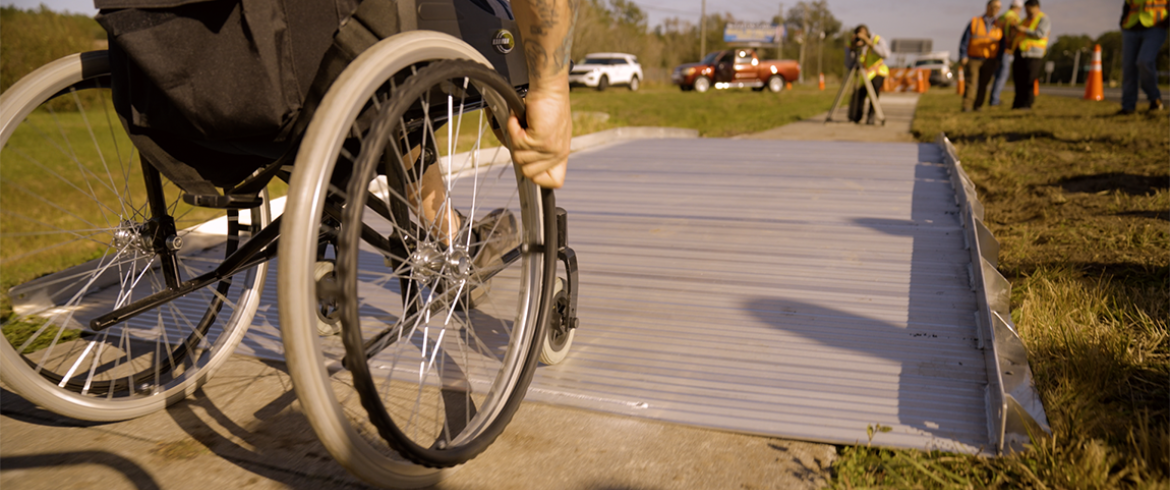
The SpanPath modular system helps pedestrians and other sidewalk users travel across terrain under repair. (Courtesy SpanPath LLC)
A FAMU-FSU College of Engineering alumnus is revolutionizing traffic safety and pedestrian accessibility with an innovation designed to protect vulnerable road users.
Gevin McDaniel, an inventor and civil engineering graduate from Florida State University, is the visionary behind SpanPath, an innovative traffic safety device created with pedestrians in mind.

McDaniel earned his bachelor’s degree in civil engineering from Florida State University in 1998. However, a personal tragedy and a gap in pedestrian safety solutions spurred his most notable innovation. His journey toward creating SpanPath began in 2016 after his brother-in-law was killed in a pedestrian accident.
“When I lost a member of my family to that crash, I came to understand the devastation that one fatality imparts on a family and a community,” McDaniel said. “Every life is precious.”
While working at the Florida Department of Transportation, McDaniel frequently encountered inadequate temporary walkways for pedestrians during sidewalk construction or repair projects. In 2020, he had a breakthrough.
“One day, it was as if God downloaded the idea for SpanPath into my mind,” McDaniel recalled. “That very evening, I sketched the initial concept and later brought it to life through engineering and design work.”
McDaniel’s determination led to the founding of SpanPath LLC, based in Tallahassee, Florida. SpanPath is a modular, elevated pathway system that integrates seamlessly over sidewalks and shared-use paths during construction, offering a safe and easily removable solution. The system ensures minimal disruption while providing secure passage for individuals, including those in wheelchairs.

“People in wheelchairs needed access when sidewalks are being worked on, and there was nothing that addressed their needs until SpanPath,” McDaniel emphasized.

The innovation has been widely recognized. SpanPath received the prestigious Innovation Award at the 2024 American Traffic Safety Services Association Convention and Expo. It has already gained approval in Florida, Georgia, Oregon, and Michigan, with plans for further expansion.
Reflecting on his journey, McDaniel credits his formative years at FSU and the FAMU-FSU College of Engineering for his success.
“My fondest memory of FSU is the ‘Noles winning the national championship in 1993 and 1999,” McDaniel said. “These were bookends to my college career. Yes, it took six years to get my degree. Engineering was a five-year program back then, and I didn’t have much direction my first year. However, I built relationships with my classmates at the engineering school that continue to this day.”
From his early uncertainty to leading innovations at the Florida Department of Transportation and founding SpanPath, McDaniel’s journey underscores the power of resilience and creativity in improving pedestrian safety and accessibility.
His advice for future engineering students?
“Never be afraid to ask questions and learn all you can from those with different approaches and viewpoints,” McDaniel said. “Never stop learning. The best advice I received from my dad was to get involved in engineering associations. They help establish relationships and networks within the engineering community that are invaluable to our careers.”
RELATED ARTICLES
Researchers at FAMU-FSU Engineering use metric-specific technology to keep seniors safer on the road
New Transit IDEA study helps researchers improve the safety of driverless public transportation
